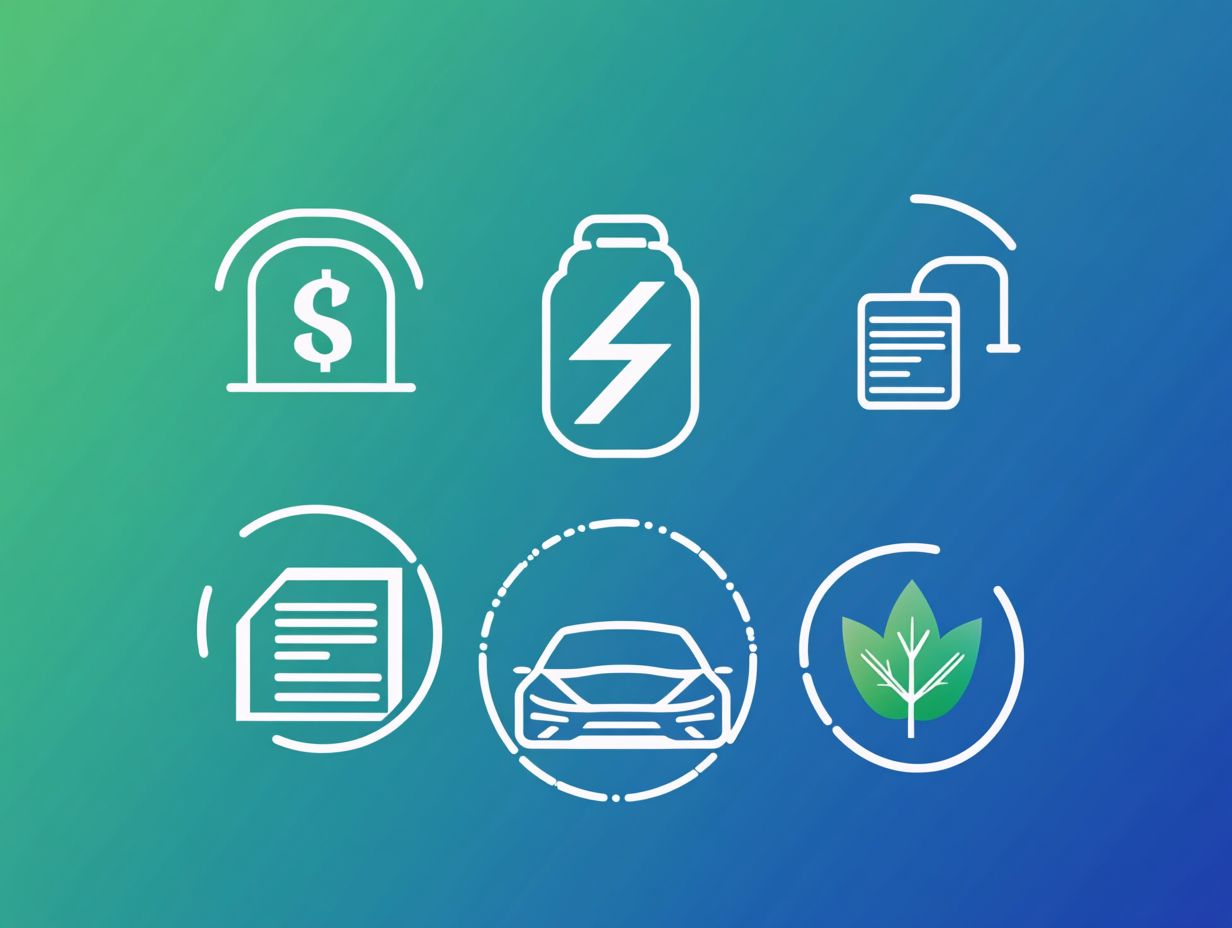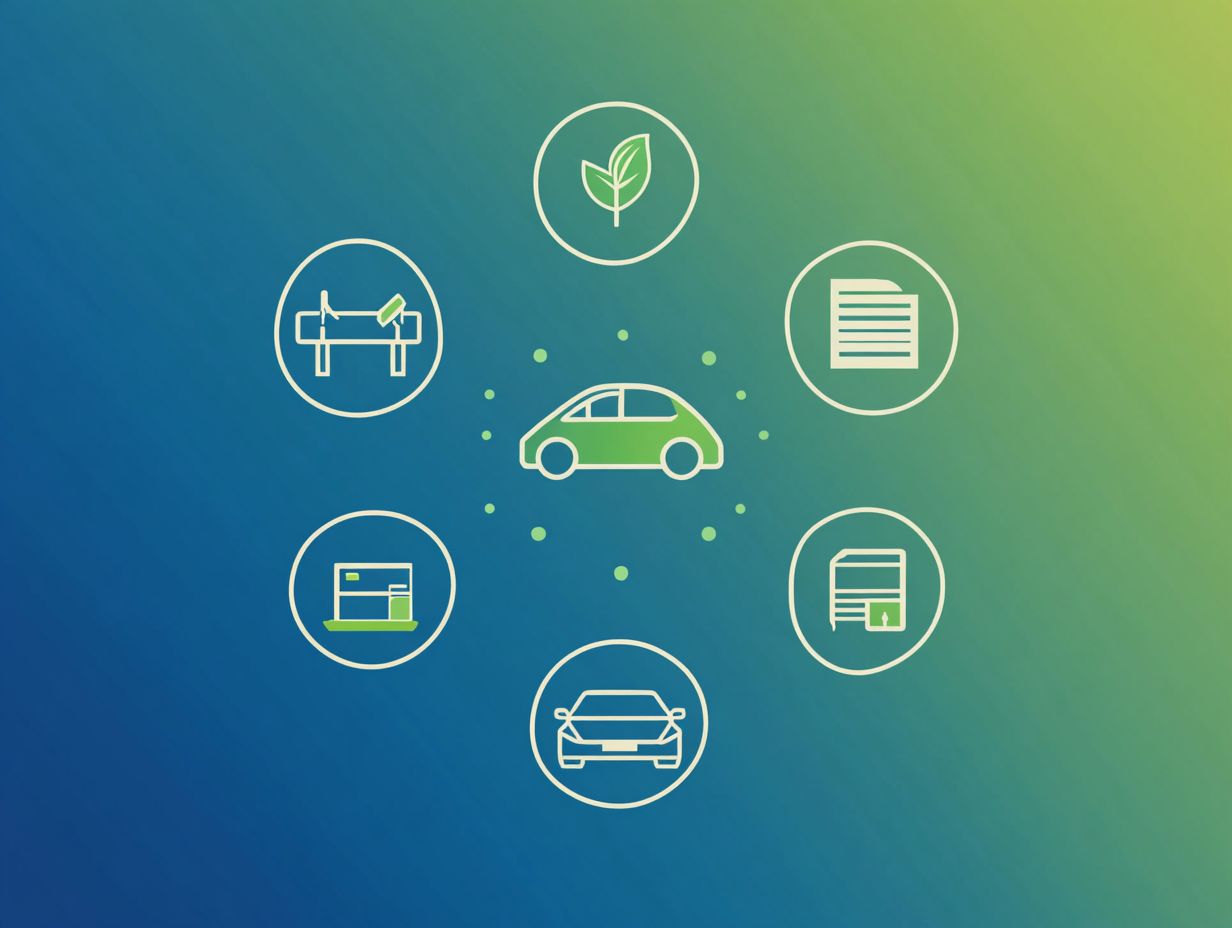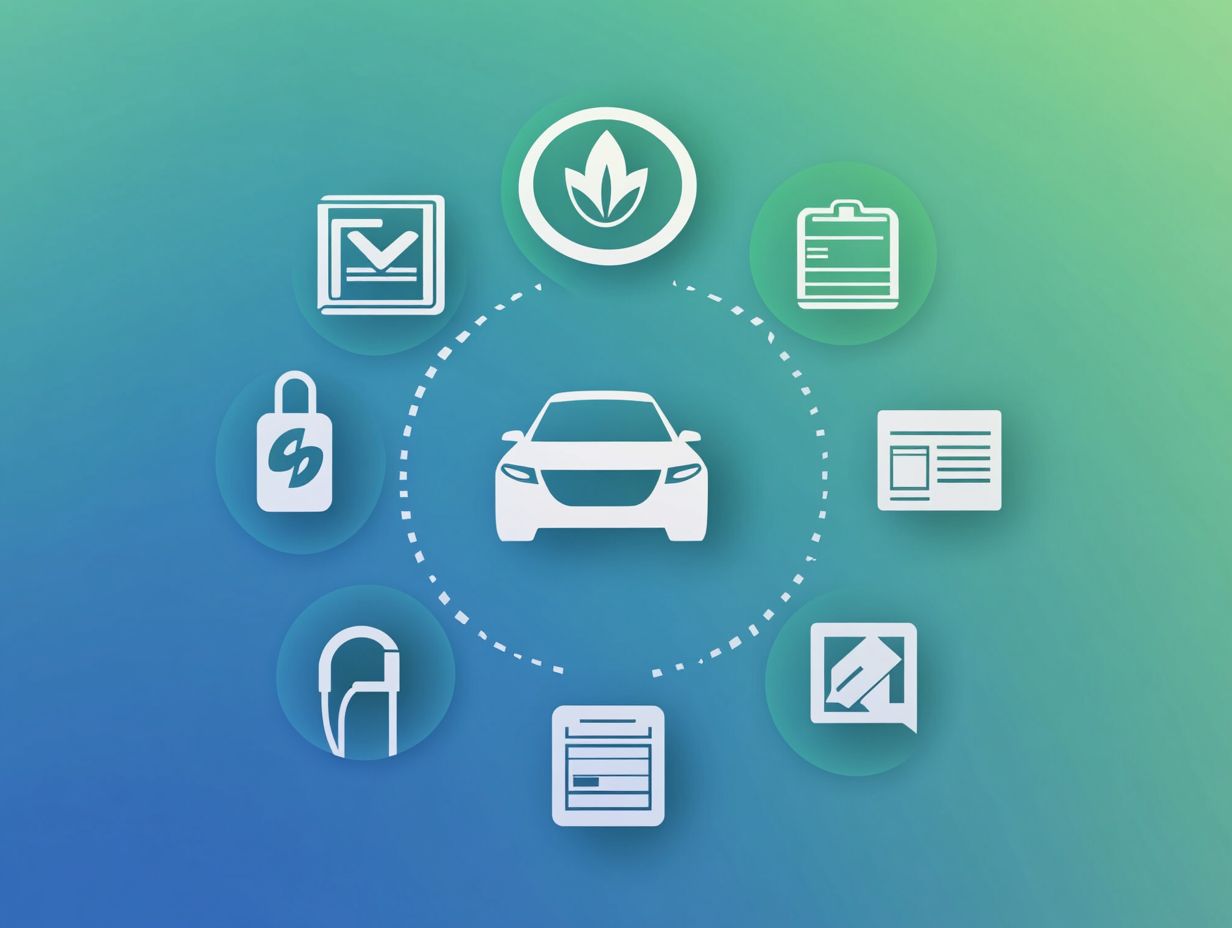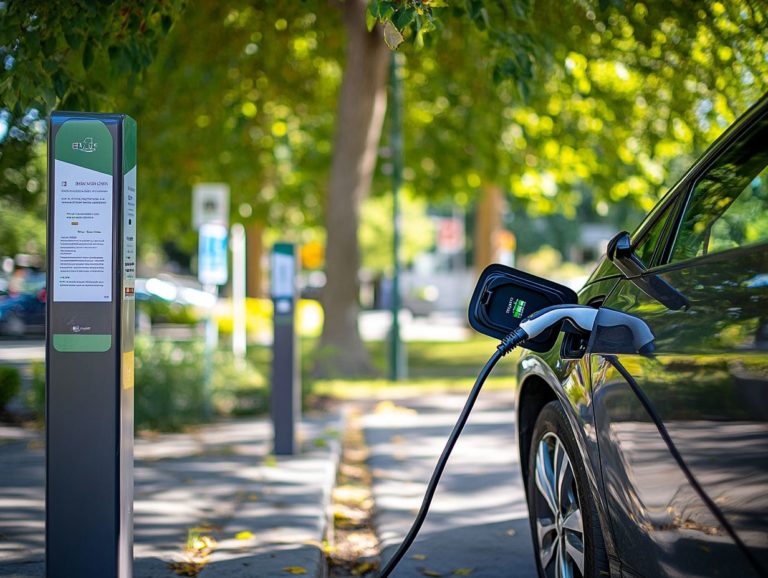5 ways ev incentives can save you money
Electric vehicles (EVs) offer more than just a pathway to a greener planet; they can also significantly ease your financial burden.
With a range of tax credits and rebates, combined with reduced maintenance costs, the benefits of owning an EV can accumulate rapidly.
This article delves into five key ways that EV incentives can bolster your savings. It reveals how these advantages vary by state while also highlighting their long-term benefits.
Whether you re contemplating a transition to electric for personal or business purposes, understanding these benefits is essential for optimizing your savings.
Dive in to discover how you can boost your EV investment!
Contents
- Key Takeaways:
- 1. Tax Credits and Rebates
- 2. Lower Operating and Maintenance Costs
- 3. Reduced Maintenance Costs
- 4. Access to HOV Lanes and Free Parking
- 5. Potential Savings on Insurance
- How Do EV Incentives Vary by State?
- Frequently Asked Questions
- What Are the Different Ways EV Incentives Can Save You Money?
- How do EV incentives help reduce your upfront costs when purchasing an EV?
- Can using EV incentives save you money in the long run?
- Are there any incentives for installing charging stations at home?
- What other benefits can EV incentives provide?
- Can EV incentives also help save the environment?
Key Takeaways:

Save money with tax credits and rebates on your electric vehicle.
Enjoy lower operating costs compared to traditional cars.
Experience reduced maintenance needs, thanks to fewer moving parts.
1. Tax Credits and Rebates
Tax credits and rebates are essential in making electric vehicles (EVs) more accessible. The federal tax credit encourages the purchase of affordable options, including used EVs and new electric cars.
Programs like the Clean Vehicle Assistance Program in California significantly offset the initial costs of acquiring your electric vehicle.
These incentives champion environmental sustainability and offer financial relief for lower-income households striving to embrace greener transportation options.
By lowering the purchase price of EVs, these incentives motivate broader adoption, amplifying the overall impact of electric vehicles in reducing greenhouse gas emissions.
If you’re keen to capitalize on these financial benefits, the process generally involves filling out the necessary forms during tax season and ensuring you meet all eligibility criteria.
As awareness of these opportunities grows, expect the adoption of electric vehicles to surge, paving the way for a more sustainable future.
2. Lower Operating and Maintenance Costs
One of the most compelling reasons to choose an electric vehicle is the lower operating costs compared to a gas car. When you factor in charging costs and maintenance expenses, owning an EV translates into substantial savings over time.
With the growing availability of renewable energy sources, many EV owners find that charging their vehicles is more affordable and sustainable than filling up with gasoline. This transition contributes significantly to long-term savings, as electricity prices tend to remain stable, unlike the unpredictable fluctuations of fossil fuel prices.
Electric vehicles generally require less maintenance due to having fewer moving parts. This means no more frequent oil changes and a reduced likelihood of mechanical problems.
Your garage bills will be lower, and the lifespan of your vehicle will be extended. Overall, your ownership experience will be not just more economical but also more environmentally friendly.
3. Reduced Maintenance Costs
Reduced maintenance costs are a significant advantage of owning an electric vehicle. The simpler mechanics and fewer moving parts lead to lower servicing expenses, a refreshing change from the constant maintenance demands of traditional gas cars.
The absence of oil changes substantially cuts down on routine maintenance tasks, allowing you to enjoy your vehicle without frequent trips to the mechanic.
Electric vehicles depend primarily on their battery systems, which, although they have a limited lifespan, can last several years with proper care. This durability contributes to your overall savings, as replacements are infrequent compared to the wear-and-tear of traditional engines.
EVs produce zero tailpipe emissions, reducing their environmental impact and aligning perfectly with the growing consumer demand for sustainable transportation options.
4. Access to HOV Lanes and Free Parking
Owning an electric vehicle gives you exclusive perks like access to carpool lanes and free parking. These incentives help encourage cleaner vehicles and reduce traffic congestion.
These benefits can enhance your driving experience. You can glide past traffic during busy hours, reclaiming time in your daily commute.
In states like California, these initiatives aim to lower vehicle emissions and promote a greener lifestyle. In Washington D.C., you can also find generous tax credits to make your switch to electric easier.
By using these advantages, you enjoy a better ride and contribute to a cleaner environment. Fewer traditional vehicles mean lower air pollution and a more sustainable future.
5. Potential Savings on Insurance

You could save money on insurance premiums with an electric vehicle. Many companies offer discounts for clean vehicle owners, recognizing the lower risk associated with EVs.
Insurance rates often consider emissions and safety features. Companies like Progressive and Geico provide significant discounts for electric vehicle owners, showing their support for eco-friendly practices.
Electric vehicles usually face fewer mechanical issues and have lower accident rates. Insurers can pass those savings on to you, making it essential to explore your options before purchasing.
How Do EV Incentives Vary by State?
EV incentives vary by state. In California and Washington D.C., you ll find strong programs offering local incentives, federal tax credits, and rebates to encourage electric vehicle adoption.
Some states don t offer as many financial incentives, which can slow your transition to electric. For instance, Texas has a state rebate that complements the federal tax credit, making it easier to buy an electric vehicle.
In contrast, Alabama offers very few incentives, which is discouraging. These differences can make it harder for lower-income households to invest in EVs.
The availability of charging stations and local incentives often affects whether these households can benefit from electric vehicles, shaping adoption rates across the country.
What Are the Different Types of EV Incentives Available?
You can find various EV incentives, including federal tax credits, state rebates, and local programs that make electric vehicles more affordable.
Federal tax credits can significantly reduce your taxable income, sometimes by over seven thousand dollars, depending on your vehicle s battery capacity.
State and local rebates often provide direct cash benefits at the point of purchase, lowering your upfront costs instantly. To qualify for these incentives, your vehicle usually needs to meet specific efficiency standards.
You’ll often need to prove your purchase and residency. By taking advantage of these incentives, you can save a lot of money while making an eco-friendly choice.
How Can a Business Benefit from EV Incentives?
You can benefit from EV incentives. These financial advantages help offset the initial costs of electric vehicles, leading to impressive cost savings. To maximize your benefits, learn how to leverage EV rebates for savings while supporting your transition to a greener fleet.
By tapping into both federal and local programs, you can lower your purchasing expenses and reduce long-term operating costs associated with fuel and maintenance. For instance, if you run a delivery service and invest in electric vans, you could seize tax credits and rebates offered by city governments, allowing you to reclaim a significant portion of your investment.
Adopting electric vehicles trims expenses and elevates your company s public image, highlighting your commitment to sustainability. This exciting approach boosts customer loyalty and attracts environmentally conscious clients, creating a positive ripple effect throughout the community.
What Are the Long-Term Savings of Owning an EV?
Owning an electric vehicle (EV) presents impressive long-term savings, arising from lower maintenance costs, reduced fuel expenses, and the possibility of tax credits that can significantly enhance your overall cost savings throughout the vehicle’s lifespan.
Imagine making fewer trips to the mechanic. With fewer moving parts than traditional gasoline cars, electric vehicles lead to lower repair costs. Plus, since electricity is often cheaper than gasoline, your ongoing charging expenses can drop considerably over time.
Many regions offer enticing incentives, such as rebates (money returned to you after purchase) and tax credits for EV owners, making the purchase even more appealing. When you consider all these savings together, it becomes clear that how electric vehicles could save you money shows they are not only an environmentally conscious choice but also a smart financial investment for those who are budget-minded.
Are There Any Disadvantages to EV Incentives?

While EV incentives come with a host of benefits, it s important to weigh the disadvantages and limitations of these programs before making the leap to an electric vehicle.
You might assume that EV incentives are available to everyone, but eligibility can be tricky, often hinging on your income level or the specific make and model of the vehicle you’re eyeing.
As electric car demand continues to skyrocket, don t be surprised if these incentives start to wane, which could lessen their financial allure. Navigating the labyrinth of local, state, and federal programs can feel daunting, leaving you confused and overwhelmed.
For lower-income households, these hurdles create additional barriers, ultimately undermining the promise of affordability and access to sustainable transportation solutions.
How Can Individuals Take Advantage of EV Incentives?
You can fully capitalize on EV incentives by thoroughly researching the available programs, such as the federal tax credit and various local incentives. Additionally, understanding how EV incentives affect your insurance costs can help ensure you maximize your cost savings when purchasing an electric vehicle.
To start, visit official government websites to pinpoint the specific incentives offered in your state or municipality. Familiarizing yourself with the eligibility criteria for both federal and local programs is essential, as these can vary widely.
Paying close attention to application deadlines is crucial; timing can significantly impact your ability to secure these benefits. Engaging with local dealerships or EV advocacy groups can also provide valuable insights, making the entire process smoother and more efficient for you as a prospective EV buyer.
Frequently Asked Questions
What Are the Different Ways EV Incentives Can Save You Money?
1. Tax Credits: Electric vehicle incentives offer tax credits that can significantly reduce the amount of taxes you owe. These credits can range from a few hundred to several thousand dollars, depending on the state and federal programs you qualify for. To determine if these options are beneficial for you, check out if EV incentives are right for you.
How do EV incentives help reduce your upfront costs when purchasing an EV?

Rebates are available from many states and utility companies when you buy an electric vehicle. These can include cash back, discounts on vehicle prices, or even free charging stations, making EVs more affordable.
Can using EV incentives save you money in the long run?
Lower operating costs are a major benefit. Electric vehicles are much cheaper to operate than traditional gasoline cars, saving you money on fuel and maintenance over time.
Are there any incentives for installing charging stations at home?
Some incentives can help cover the cost of installing a charging station at your home. This can save you money on charging fees and make it easy to charge your EV at home.
What other benefits can EV incentives provide?
Some states offer incentives that allow electric vehicle owners to use the carpool lane even if they are driving alone. This can save time and reduce daily commute costs.
Can EV incentives also help save the environment?
By switching to an electric vehicle, you can help reduce your carbon footprint and contribute to a cleaner environment. Take advantage of EV incentives today to help create a cleaner tomorrow!






